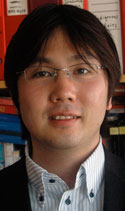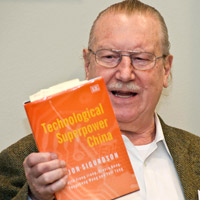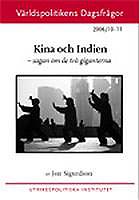SWEDISH SOUTH ASIAN STUDIES NETWORK
Stockholm School of Economics
Postal address: Handelshögskolan i Stockholm, Box 6501, SE-113 83 Stockholm
Visiting address: Sveavägen 65
Web page: http://www.hhs.se/
South Asia related research
 PhD candidate Naonori Kusakabe is a
Research Fellow from the Center for South Asian Studies at Gifu Women's University in Japan. From the spring 2010, Mr. Kusakabe is affiliated to Stockholm School of Economics, and in particular its European Institute of Japanese Studies as a Visiting researcher, first in Stockholm and then from July 2010 based at the University of Dhaka in Bangladesh. He is currently working on a comparative study of Swedish and Japanese Official Development Assistance (ODA) towards Bangladesh both now and in the past. Naonori Kusakabe is supervised in his thesis work by Prof. Marie Söderberg, Director for the European Institute of Japanese Studies.
PhD candidate Naonori Kusakabe is a
Research Fellow from the Center for South Asian Studies at Gifu Women's University in Japan. From the spring 2010, Mr. Kusakabe is affiliated to Stockholm School of Economics, and in particular its European Institute of Japanese Studies as a Visiting researcher, first in Stockholm and then from July 2010 based at the University of Dhaka in Bangladesh. He is currently working on a comparative study of Swedish and Japanese Official Development Assistance (ODA) towards Bangladesh both now and in the past. Naonori Kusakabe is supervised in his thesis work by Prof. Marie Söderberg, Director for the European Institute of Japanese Studies.![]()
His research interests include Civil Society and NGOs, Development studies, Disaster management, and Climate Change. He has spent more than four years in Bangladesh, and in 2006 he wrote his Masters thesis as a student of Sophia University in Tokyo, on ”NGOs and Local People: A Case Study of Hatiya Island in Bangladesh”. It is available on the Internet, however in Japanese only. Go for the thesis.
Mr. Kusakabe is also concerned about the effects of damaging cyclones in Bangladesh. Recently, he has written a research paper entled ”The Expansion Factor and Reduction Factor of Cyclonic Damage in Bangladesh – Lessons from the Cyclone Sidr in 2007”. It may soon be published.
The Swedish School of Advanced
|
 Until recently, Professor Emeritus Jon
Sigurdson worked as Director for the East
Asia Science & Technology and Culture
Programme at the
Stockholm School of Economics. Earlier, during the period 1978–1996, he was Director for the Research Policy Institute, Lund University.
Until recently, Professor Emeritus Jon
Sigurdson worked as Director for the East
Asia Science & Technology and Culture
Programme at the
Stockholm School of Economics. Earlier, during the period 1978–1996, he was Director for the Research Policy Institute, Lund University.
From
1995 till 2000, Sigurdson held the endowed ASTRA Professorship of East
Asia Science & Technology and Culture at the Stockholm School
of Economics, and between 2001 and 2003 he was Director for the Swedish
School of Advanced Asia Pacific Studies (SSAAPS) – see information in the box.
As a researcher in science policy Jon Sigurdson has developed special expertise in technology management at national and company level with a focus on areas such as: 1) Global structures for research and development (R&D) and their interaction with national systems for innovation; 2) Structural changes in the electronics and information technologies industries. Sigurdson held government posts in Swedish ministries of Foreign Affairs, Finance, and Industry before embarking on an academic career. Recent research has focused on China as an emerging technological superpower.
Even
though Prof. Sigurdson’s
research mainly focused on China, he has also made a number
of comparative studies that have included India. In 1997 he published
an article together with the Dr. Prasada
Reddy at Lund University’s Research
Policy Institute entitled ”Strategic
location of R&D
and emerging patterns of globalization: the case of Astra Research
Centre India” in the International Journal of Technology
Management. The main objectives of the paper were
to analyse the driving forces behind the move by transnational
corporations (TNCs) to carry out some of their strategic
R&D in some developing and East European countries. The results
of the study indicate that the primary driving forces behind the
emerging phenomenon are the companies' efforts to gain access to
scientific personnel as well as to reduce R&D costs. The companies
involved are observed to be mostly those dealing with science-based
technologies.
More
information about the article.
 In
November 2006 Jon Sigurdson wrote a book entitled ”Kina
och Indien – Sagan om de två giganterna (in
Swedish: China and India – A tale of the two giants),
that was published by the Swedish Institute of Foreign Affairs
(Utrikespolitiska Institutet). Here, Sigurdson shows how both India and
China started to open up their economies during the 1980s and 1990s,
and especially China has managed to attract a large number of foreign
companies. This has created a dependence on imported technology,
and therefore both countries now strive to build up their own R&D.
In this respect China is still far ahead of India, but many observers
believe that India – because of its democratic system – finally
will surpass China. The continued expansion of the Chinese and
Indian economies will however most probably cause deep tensions
in the rest of the World.
In
November 2006 Jon Sigurdson wrote a book entitled ”Kina
och Indien – Sagan om de två giganterna (in
Swedish: China and India – A tale of the two giants),
that was published by the Swedish Institute of Foreign Affairs
(Utrikespolitiska Institutet). Here, Sigurdson shows how both India and
China started to open up their economies during the 1980s and 1990s,
and especially China has managed to attract a large number of foreign
companies. This has created a dependence on imported technology,
and therefore both countries now strive to build up their own R&D.
In this respect China is still far ahead of India, but many observers
believe that India – because of its democratic system – finally
will surpass China. The continued expansion of the Chinese and
Indian economies will however most probably cause deep tensions
in the rest of the World.
More
information about the book.
In October 2002,
Jon Sigurdson was invited as a Senior resource person to participate in SASNET’s
Symposium for PhD candidates and post-docs in Marstrand, and present
the programmes of SSAAPS.
Read his presentation
at the SASNET Symposium .
SASNET - Swedish South Asian
Studies Network/Lund University
Address: Scheelevägen 15 D, SE-223 70 Lund, Sweden
Phone: +46 46 222 73 40
Webmaster: Lars Eklund
Last updated
2010-11-05
